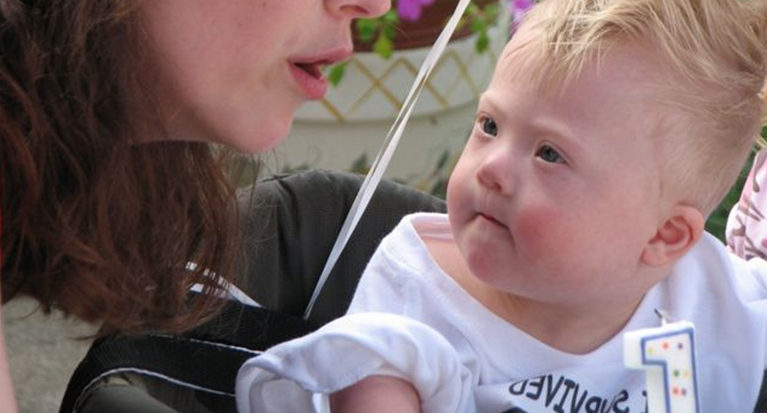Luke Pardue looks like your typical mischievous toddler.
“He’s hysterical,” his mother, Martina Pardue, said. “He likes to play his dad; Luke knows what he can get away with. He loves to eat, he just learned to crawl and likes to explore things.”
If you ask his mother, he gets into too many places sometimes. Luke, however, isn’t completely typical for two reasons.
The first reason is that Luke has Down Syndrome, a rare genetic disorder. A single chromosome, which has 2 copies normally, will have a full or partial third copy. This leaves the person usually with mental disabilities, slower development, and the well-known physical differences including eye shape. There are also treatable health issues associated with the syndrome, but the effects can vary from person to person according to the National Down Syndrome Society.
The second reason Luke isn’t typical is that for every toddler diagnosed in the womb with Down Syndrome, there are nine more who never had a chance to learn to crawl, or explore or entertain their parents with trouble only a toddler could create. About 90 percent of Down Syndrome babies who are diagnosed in the womb are aborted, according to an English study.
Martina Pardue and her husband, Rob, found out 10 weeks into her pregnancy that Luke may have Down Syndrome. They had an amniocentesis test, where the amniotic fluid is tested to detect any potential health problems. After confirming the results, they had a meeting with several health professionals including her obstetrician and the doctor who performed the test.
During the meeting, the doctor who performed the amniocentesis test offered abortion as an option for the couple. Martina said she was very adamant in her and Rob’s desire to have Luke, and that she stopped the doctor in mid sentence. She said that her obstetrician was very supportive of their choice.
“My [obstetrician] was excited for my decision, he went through several miscarriages with his wife and ended up adopting 2 children,” she said.
Martina added that she is very grateful to be Luke’s mother, since many people like her obstetrician can’t have children of their own.
“It’s a miracle,” she said. “There are people out there who can’t get pregnant, and we were blessed that we could.”
Many parents who choose abortion do it out of fear for caring for a Down Syndrome baby or the possible severity of the condition according to Martina. She thinks the fact that thousands of Down Syndrome babies like Luke are aborted is very painful.
“It hurts,” she said.
She also thinks that aborting babies with disabilities isn’t right. She points out that while Luke may have a genetic disorder, that doesn’t mean his life is any less worthwhile or less happy than other children.
“There is nothing wrong with him, I would not trade him for the world,” she said.
There are more options for parents of Down Syndrome babies than abortion as Martina points out. According to the National Council for Adoption, there is a waiting list of parents willing to adopt children with Down Syndrome.
“It’s not fair to that child that you make the decision if they live or die,” she said. “If you can’t emotionally deal with it, then you can place the child with someone who will give them the love and care they need through adoption.”
Martina hopes that parents faced with the difficult news that their child has Down Syndrome should keep other choices than abortion in mind. She added there are plenty of support services to help them with their child, like Families Exploring Down Syndrome near Detroit. She said that parents should also seek advice from other Down Syndrome parents.
“If anybody is ever in our situation, I suggest they talk to someone who has experienced it,” she said.
Martina and Rob are happy with Luke in their lives, even when he does crawl his way into more mischief.
“Luke is here for a reason,” she said. “Luke is here to teach somebody something. If he can change one person’s mind about having an abortion, that makes me happy.”
